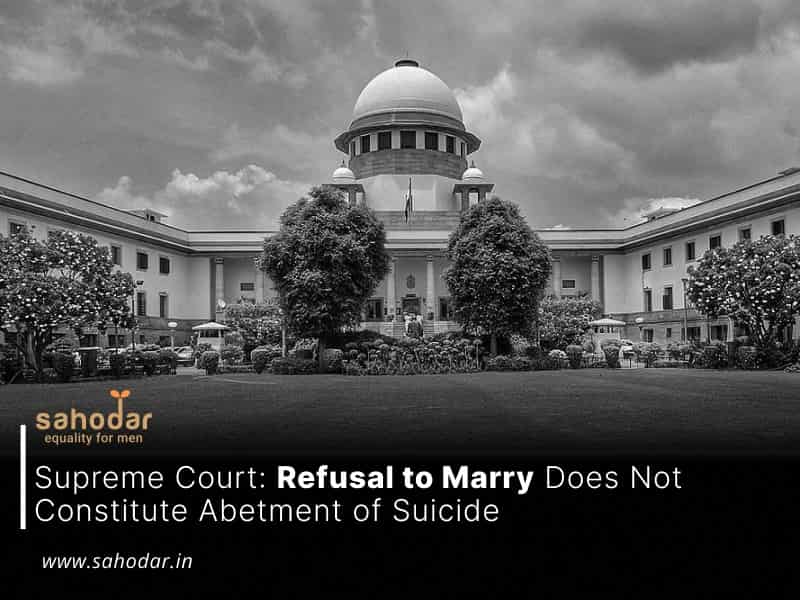The Court observed that the deceased’s dying declaration contained no claims of a physical relationship or sexual intercourse with the accused based on a promise of marriage.
The Supreme Court on Friday held that the mere refusal to marry does not constitute the offence of abetment of suicide under the Indian Penal Code (IPC) [Kamaruddin Dastagir Sanadi v. State of Karnataka].
This ruling was delivered while acquitting a man accused of cheating and abetment of suicide under IPC provisions in connection with a 2007 case. The case involved the man declining to marry a woman, who subsequently died by suicide.
A Bench comprising Justices Pankaj Mithal and Ujjal Bhuyan determined that there was no direct evidence showing that the appellant had instigated or encouraged the deceased to take her own life.
“The accused-appellant on asking of the deceased had simply refused to marry her which is not a positive act on his part with any intention to abet the crime of suicide…even assuming there was love between the parties, it is only a case of broken relationship which by itself would not amount to abetment to suicide. The accused-appellant had not provoked the deceased in any manner to kill herself; rather the deceased herself carried poison in a bottle from her village while going to Kakati, Karnataka with a predetermined mind to positively get an affirmation from the accused-appellant to marry her, failing which she would commit suicide. Therefore, in such a situation simply because the accused-appellant refused to marry her, would not be a case of instigating, inciting or provoking the deceased to commit suicide,” the Court said.
The appellant challenged his conviction by the High Court under Sections 417 (cheating) and 306 (abetment of suicide) of the Indian Penal Code (IPC).
The prosecution alleged that the appellant had promised to marry a 21-year-old woman who had been in love with him since she was 13 years old. Following his refusal to marry her, she consumed poison and died by suicide.
The trial court initially acquitted the appellant of all charges, citing a lack of evidence regarding a sexual relationship, instigation, or intent to abet suicide.
However, on appeal by the State of Karnataka, the High Court overturned the acquittal and convicted him. He was sentenced to one year of imprisonment for cheating and four years for abetment of suicide.
The Court observed that the deceased’s dying declaration did not include any allegations of a physical relationship or sexual intercourse with the accused under the pretext of marriage.
“The dying declaration indicates that it was the deceased who was in love with the accused-appellant and wanted to marry him. When the accused-appellant had left the village, it was the deceased who made search about him and came to know that he was residing in Kakati. She herself traced him out at Kakati and went after him. She called him and when they met, he refused to marry her and thus, as her sentiments were hurt, she consumed poison leading to her death,” it added.
The Court further observed that the deceased made no allegations that the appellant had instigated her to consume poison or end her life, and there is no evidence to support such a claim.
“Even the mother of the deceased (PW-1) in her statement revealed that it was the deceased who was in love with the accused-appellant and that she wanted her mother to convince him to marry her,” the Court stated.
Regarding the promise to marry, the Court observed that it was allegedly made during a jamaat (panchayat) meeting before the village elders, with two witnesses testifying about the proceedings.
However, the Court noted that although these witnesses had given a written document detailing the panchayat proceedings to the deceased and her mother, the mother did not produce this document to substantiate the claim that the appellant had promised or agreed to marry her daughter.
Consequently, the Court set aside the appellant’s conviction and acquitted him.

